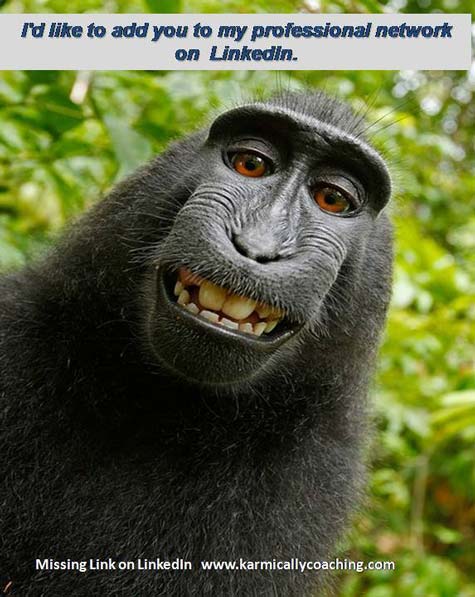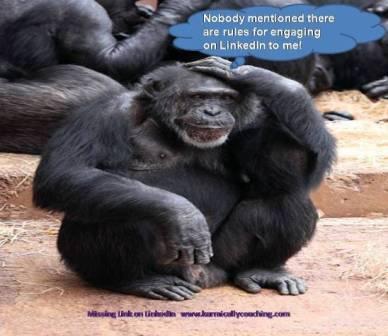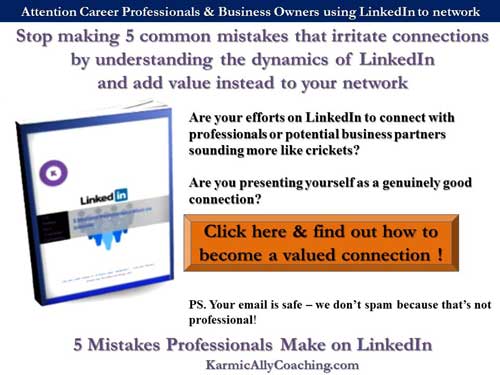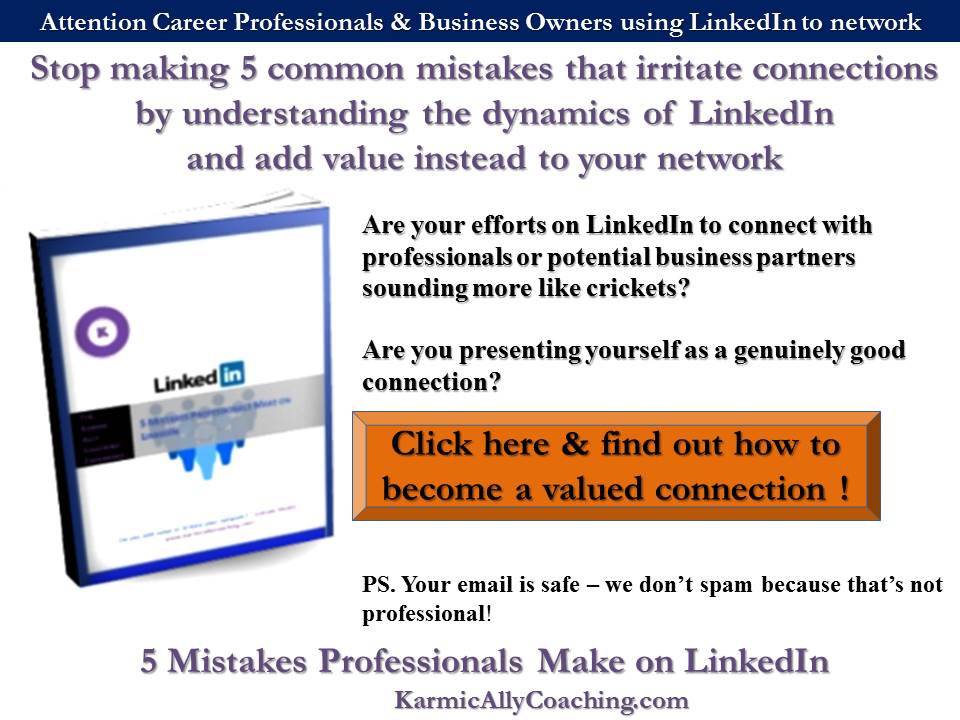
As a newbie to LinkedIn back in 2008, I learned something from a L.I.O.N in disguise.
I promised myself, I was not going to be a chimp and decided to set up my first LinkedIn policy long before I knew that there was something called a social media policy.
This week, I’m taking out another real story from my life on social media and sharing precious lessons learned.
The story about connecting with the Missing Link
A few years back, when I was still deeply into my IFRS consulting practice, a trusted friend introduced me to a gentleman whom he knew through his family. Since the gentleman and I had a similar profile, his intention was that perhaps we could work together on projects. Preliminaries went well.
It was decided that we would get in touch when the right opportunities arose, and I happily accepted an invitation to connect on LinkedIn. At that point, the new contact had about 25 connections.
A month later, I saw his name on my news feed bouncing with contacts, many of whom were personally known to me. These were not the ones you see in the People You May Know section and blindly click to connect with, but people who I had actually worked with.
So out of curiosity I checked his LinkedIn Profile.
In 2 weeks, he had jumped to over 250 out of which at least 12 were former colleagues of mine.
I thought to myself, this is great; I can get more references about his professional style from my colleagues. What happened next left me gob smacked.
My colleagues said they did not know him from Adam and connected for 1 reason – they saw my name and that was good enough for them.
I went back to my friend and told him what was happening. Seems the same had happened with him and he was angry. I remember him saying something to the effect that if street dogs had LinkedIn profiles, this guy would connect there too!
In subsequent chats he was jokingly referred to as the Missing Link.
We both disconnected from him as did many others.
The last I heard of him, he had managed to get himself featured as a LinkedIn Power Profile for the 5 most viewed profiles in his niche that same year and he actually has that as an accomplishment on his profile.
My friend and I know how he did it and I admire him for his strategy. No harm in giving the Devil his due, but even now, I cannot help but wonder – does he have a strong connection with his contacts or is it a numbers game for him?
How do you ensure you don’t end up being called a Missing Link? Or much worse by people behind your back when you try to connect?

Here are 10 pointers:
- Understand that LinkedIn is a professional social media platform. People want to connect to further professional or business interests, not win popularity contests. They want to know you professionally and not learn about your private life. Keep it professional.
- If you are trying to connect with someone who is outside of your circle, find a reason to connect. Make it worthwhile for the other person to accept your invitation. Is it an author whose books influenced you years ago? Mention it. Is it someone who posted on a Group Page and caught your attention? Mention it. Do you think that connecting would be beneficial to the other person? In that case, why not mention it? People like to know that there is a common thread that ties you together. Not just an open networker playing a numbers game.
- Following from the above point, when you send out your invitation to connect, don’t use the generic
“I’d like to add you to my professional network on LinkedIn.”
Instead, introduce yourself telling them how you found them and why you would like to connect.
- Alternatively, if they are a Group Member, send them a mail asking to connect. Let them take the call. Some of my best and most meaningful connections to date have started that way.
- If you are inviting someone to connect whom you have met at a networking event or at a seminar, mention it in your invitation. The same applies if you are connecting with someone after many years. Remind them of who you are. Not everyone uses LinkedIn like Outlook Express. Some log on once or twice a week. Unless they are able to remember you, they might just put you in Spam or report that they do not know you, which is embarrassing.
5 important tips once you’ve created the LinkedIn network connection
- Once your invitation is accepted, send an acknowledgement. If you have not already mentioned how you could benefit the new contact at the invitation stage, now is a good time to bring it up. (Refer to my blog post Do You Network or Netweave?)
- By this point, you are ready to start creating a meaningful and mutually beneficial network connection. You need to nurture it and the best way is to pay attention to them. By this, I mean, look at your activity feed. Have they shared a post? Have they had a promotion? Communicate and connect. Hit the Like button or write a few words. Maybe send them a private message?
- Keep your interactions professional and do not spam them. Refrain from getting personal in front of everyone. If they share a post make sure your comments lead to further professional interactions which enable others to join in and keeps the conversation flowing.
- Don’t assume that if the other person has accepted your LinkedIn invitation, he will also accept your Facebook request. It can give the impression that you are trying to stalk them or worse.
- Mind your manners at all times. If the new contact can accept your invitation to connect they can easily disconnect and even block you without your knowledge which I feel can be quite embarrassing.
There are so many other rules of engagement – don’t make these mistakes
What’s your experience of networking on LinkedIn? I’d love to read them. Share your LinkedIn experiences with me in the comments box below!
.
Written By: Vatsala Shukla originally in February 2013 and updated for content.





 I adhere to the Certified Coaches Alliance Code of Ethics and Standards. A copy is available on request.
I adhere to the Certified Coaches Alliance Code of Ethics and Standards. A copy is available on request.
 Let's Talk through the Connect Form:
Let's Talk through the Connect Form: